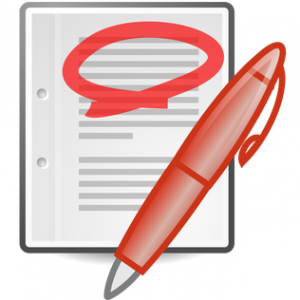 Teaching English to English speaking students should be easy. Linguistic scholars say that youths who have reached twelve to fourteen years of age have developed excellent internal grammar in their native language, whether it is English, Spanish, French, German, Chinese, Japanese or any other language for that matter. But if you are a teacher who deals with persuading students to write in formal style, then it all becomes a little more challenging.
Teaching English to English speaking students should be easy. Linguistic scholars say that youths who have reached twelve to fourteen years of age have developed excellent internal grammar in their native language, whether it is English, Spanish, French, German, Chinese, Japanese or any other language for that matter. But if you are a teacher who deals with persuading students to write in formal style, then it all becomes a little more challenging.
Consider this story: A home-school mom contacted a retired teacher – who just happened to be her mother. “Mom,” she asked, “What do you think of Cindy’s paper?” The retired teacher mulled over the child’s work. It wasn’t a bad piece of writing coming from a thirteen-year-old author, but it had many mistakes that needed to be addressed when turning in the final version. The draft was riddled with punctuation errors, typos, and misspelled words. “It is a good first draft,” the retired teacher said. “But mom, that’s her final draft, and I think she is done,” the home-schooling mother replied.
The home-schooling mother was faced with a dilemma frequently encountered by English teachers: Do you praise the creativity and the organization, letting the grammar, punctuation, and spelling go? Or do you discourage a budding author/writer/researcher by insisting that the errors be repaired? That’s tricky.
As with many things, the answer lies somewhere in the middle because creativity and enthusiasm are essential to encouraging young writers to write and to enjoy their topic of choice. Squelch that, and you have possibly squelched the next generation of talent – or at least alienated student and teacher.
However, somewhere in the learning process, writers do need to learn how to write – and that means learning how to spell, to punctuate, to correctly construct a sentence, and above all, how to proofread.
Amazon.com’s policy of allowing authors to self-publish has made available excellent books of both fiction and non-fiction that might otherwise have never survived the brick-and-mortar publishing house process. Some of these books have even been picked up by established publishing houses, creating further opportunities for the authors. However, this revolution has also given rise to a plethora of less-than-stellar published works. Some of them are simply first efforts that have a good chance of becoming better, while others are hastily created works of garbage that deserve every bad review they get. They are the literary equivalent of the “bad” singers who audition for American Idol.
One could argue that self-published books have been put together in the heat of the moment. Author/blogger, T.S. Paul, wrote, “I just pressed the publish button. That book should be along in a minute.” It should be pointed out – in all fairness – that Paul is a good writer. His stories move along at a decent clip, the characters are well developed, the “ordinary” days highlight fun moments in the characters’ lives, and the action scenes are cogent to the plot.
However, the speediness of getting his books finished might hurt the overall experience in reading them because of errors. The reader encounters phrases such as “She just freaked out,” or “Tom and Jerry meet up,” or a personal favorite for that finger-nails-on-the-blackboard feeling, “He or she was looking to.” It makes a reader want to send the writer a link to thesaurus.com.
Too picky? Perhaps. But the great authors who write well don’t make those kinds of mistakes often. And to be taken professionally, one should make an effort to write professionally.
Where should the line be drawn?
Not so many years ago there was a call for legal documents to be written in “plain English” so that those who are not cognizant of the meaning of certain Latin phrases would be able to understand the intent of the document. People would get lost in legalese because of phrases like “party of the first part” and “party of the second part” scattered among the “whereas” and “fore to” references. Or they would be confounded by the differences implied by similarly written terms such as “ad hoc” or “ad hominem.”
Language is intended to convey meaning. If people do not understand the point of what is written, by definition that makes it pointless. When blatant errors plague writing, it makes the manuscript harder to read. Too many errors and it becomes like reading legalese.
For that reason, it is important for students to learn the standard spelling of words and the accepted ways to punctuate and construct sentences. It is not difficult to understand the need for this by using the classic example of the need for correct comma placement: “Let’s eat Grandma,” vs. “Let’s eat, Grandma.” The first sentence implies cannibalism, while the second invites the grandmother to lunch.
When one is seeking to appear well-versed in rhetoric or the art of communication, they should avoid many of these easy-to-avoid mistakes. It takes a bit more time, but the payoff is worth the extra effort.




